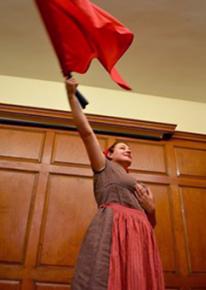Jack London strides onto the stage
reviews a New York City theatrical production of The Iron Heel.
TODAY, JACK London is mostly taught as the author of the venerable wildness novels The Call of the Wild and White Fang. Much less frequently is it mentioned that he was a self-taught, working-class radical who was one of the great popularizers of socialism in the early decades of the 20th century.
The Iron Heel is London's most political novel and is considered one of the first modern dystopian science fiction novels.
The story is told through the journal of Avis Everhard, supposedly hidden at the beginning of the 20th century and discovered centuries later by historians living in a socialist society. Everhard's journal tells how a wave of class struggle broke out in the early years of the 20th century, only to fail and be met with a vicious counterrevolution and the establishment of an oligarchic dictatorship known as the Iron Heel.
Via the journal, the novel follows the rise and fall of Avis, the middle-class daughter of a university physics professor who joins the socialist movement, and her husband, a Marxist revolutionary, Ernest Everhard.

Written in 1908, the novel is in many ways visionary, writing prophetically about a rise in class struggle against an impending world war (although in London's novel, the movement is successful), an ensuing Great Depression that ruins the middle classes, and the rise of dictatorships in Germany and Japan, which attack Hawaii and bolster the American dictatorship's drive to war.
It's also a novel that on first glance doesn't seem easily adapted to the stage. Much of it consists of long speeches and arguments that, despite their political clarity, sometimes feel like abbreviated chapters ripped from the works of Marx and Engels, not conversations between real people.
The fictional journal is annotated with footnotes from a future historian about the "factual" accuracy of the journal. Plus, with uprisings, battles and urban warfare, it reads more like a modern (albeit-Marxist) action movie than it does an intimate piece of theater.
So it's all the more impressive that the United Theater Companies' adaptation highlights the best aspects of London's work while also shoring up some of it weaker points.
ARTISTIC DIRECTOR Edward Einhorn sets the play as the work of a community theater group living in the future socialist society and presenting a dramatic re-enactment of the Everhard Manuscript (as it has come to be known) to their comrades.
The result is a series of interjections and asides from performers--a style clearly influenced by the work of Bertolt Brecht--that break up some of the long speeches with political insight and humor, and even poke fun at London's sometimes one-dimensional characters.
Like in Brecht's work, the play is also punctuated with live music and several sing-alongs--many of them well-known labor songs rewritten to fit the alternate history of the play.
The production also manages to give the story a deeper emotional impact thanks to the terrific cast, especially the tragic fate of the local bishop played by Craig Anderson--influenced by Everhard, he quits the church and devotes his life to serving the poor, only to be declared mad and locked in an asylum.
Victoria Rulle (Avis) and Charles J. Ouda (Ernest) make the love story much more touching than it is in the original novel. And Einhorn manages to explore the issues of the role of the individual in history and role and necessity of violence in social change.
But most of all, the production brings alive the hope and horror of the revolutionaries who fought in the early 20th century in a way that feels relevant and contemporary to a modern audience.
Readers of Socialist Worker will especially appreciate the scenes of the 1912 election campaign between a Republican supporter of the Iron Heel, Everhard for the socialists, with the Democratic Party caught in between.
The production is playing in a series of non-traditional venues around New York until September 5. A full schedule can be found here.


